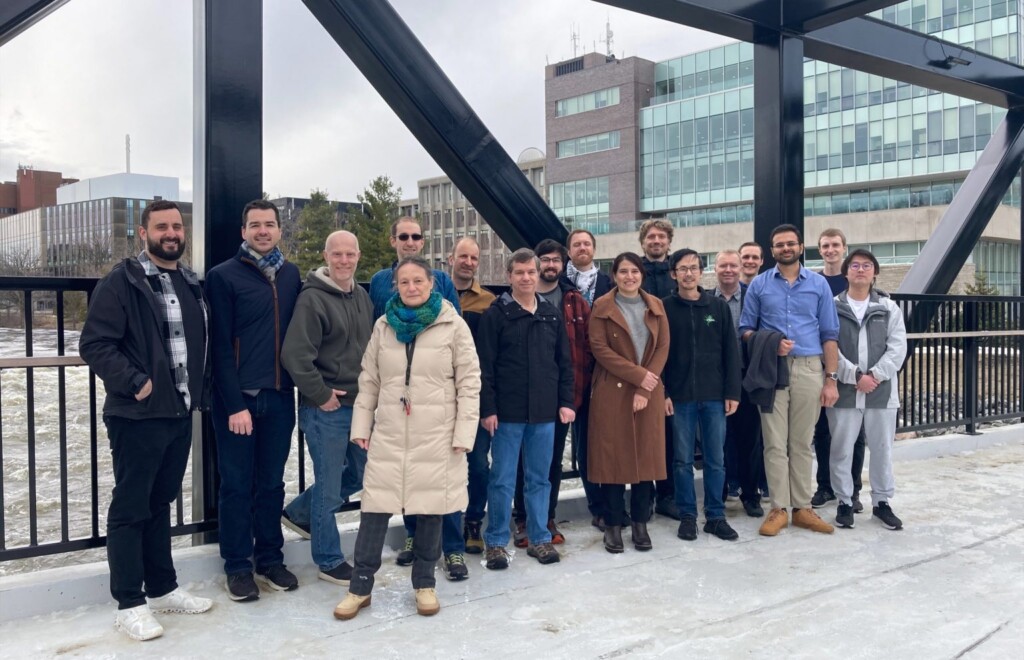Physics PhD Students Working on ATLAS Collaboration that Won Breakthrough Prize
Carleton Physicists Awarded 2025 Breakthrough Prize for ATLAS Collaboration: Graduate Students Integral Part of Research at ATLAS
Carleton University graduate students in Particle Physics working on the international ATLAS Collaboration are a part of the research team awarded the 2025 Breakthrough Prize in Fundamental Physics for its “pioneering studies of the high-energy collisions from the Large Hadron Collider.”
Located in Geneva, Switzerland, the Large Hadron Collider and the ATLAS experiment is one of the largest and most complex scientific instruments in existence.
When PhD student Dylan Pizzi first heard about the ATLAS Collaboration receiving the prize, he was surprised, but felt it was well deserved. “It speaks to the dedication the Collaboration has to further our understanding of fundamental science, and I was truly honoured to be a part of it,” said Pizzi.
“Being able to work side-by-side with experts in the field has been an invaluable opportunity in my own research. During my time, the experiment has performed several world-leading measurements studying the Standard Model of particle physics, many performed by Carleton scientists. The future of the experiment is promising, and the upcoming upgrades will allow even more precise studies into the Higgs boson and searches for new particles, such as the elusive dark matter.”
Bryce Norman is also a PhD student working on the ATLAS Collaboration.
“It has been incredible to be a part of this international collaboration and study at the forefront of particle physics research. Carleton graduate students have made many contributions to ATLAS analyses, including researching the Higgs boson and exploring new dark matter candidates and I am proud to be a part of the Carleton team,” said Norman.
“Part of my research has been testing components of a detector upgrade here in Ottawa, which will eventually be installed in the ATLAS detector in the coming years. It seems like ATLAS has just started to scratch the surface of what we can discover at the Large Hadron Collider, and it is exciting to think that I have had a hand in the detector upgrades which are necessary for the next phase of particle physics research.”
The excitement of this prize being awarded to more than 3,000 scientists is positive feedback for this unique collaboration according to PhD student Ian Alejandro Ramirez-Berend. “This shows that there is precedent for notable awards such as this to go to more than a few exceptional individuals, especially since, at least in our field, progress is rarely made by one person alone anymore,” said Ramirez-Berend.
Joining the Carleton-ATLAS team has been one of the best decisions of his career said Ramirez-Berend.
“When I was just starting my undergrad, I thought of the experiments at CERN as a pipe dream: something to aspire to, but not realistic. So, it was an incredible opportunity to get to join the team at Carleton working on the previous upgrades to the detectors which have already been installed in the experiment. Now, I am currently posted at CERN for the year, where I do research on both dark matter and the Higgs Boson, two of the most exciting topics in particle physics,” said Ramirez-Berend.
When Ramirez-Berend started at ATLAS, the project was in its final year of its previous data-taking run, measuring proton collisions at the highest energy of any particle accelerator to date. The Collaboration has now upgraded several components of the detectors, gone to even higher collision energies, and more than doubled the amount of data collected.
“Although the upgrades between these two runs represent major improvements, the next phase of the Large Hadron Collider and the ATLAS detectors are truly game-changing, but we will have to wait until mid-2030 to see the benefits of all the work that is going on now to prepare,” said Ramirez-Berend.
For more details on the Breakthrough Prize and the ATLAS Collaboration, please visit our research website here.
“One final thing I would like to recognize, is the amazing work done by the Carleton ATLAS group,” said Pizzi who just graduated. “The team is led by world-class researchers who take leading roles within the Collaboration, leaving Carleton’s mark on the international stage.”
